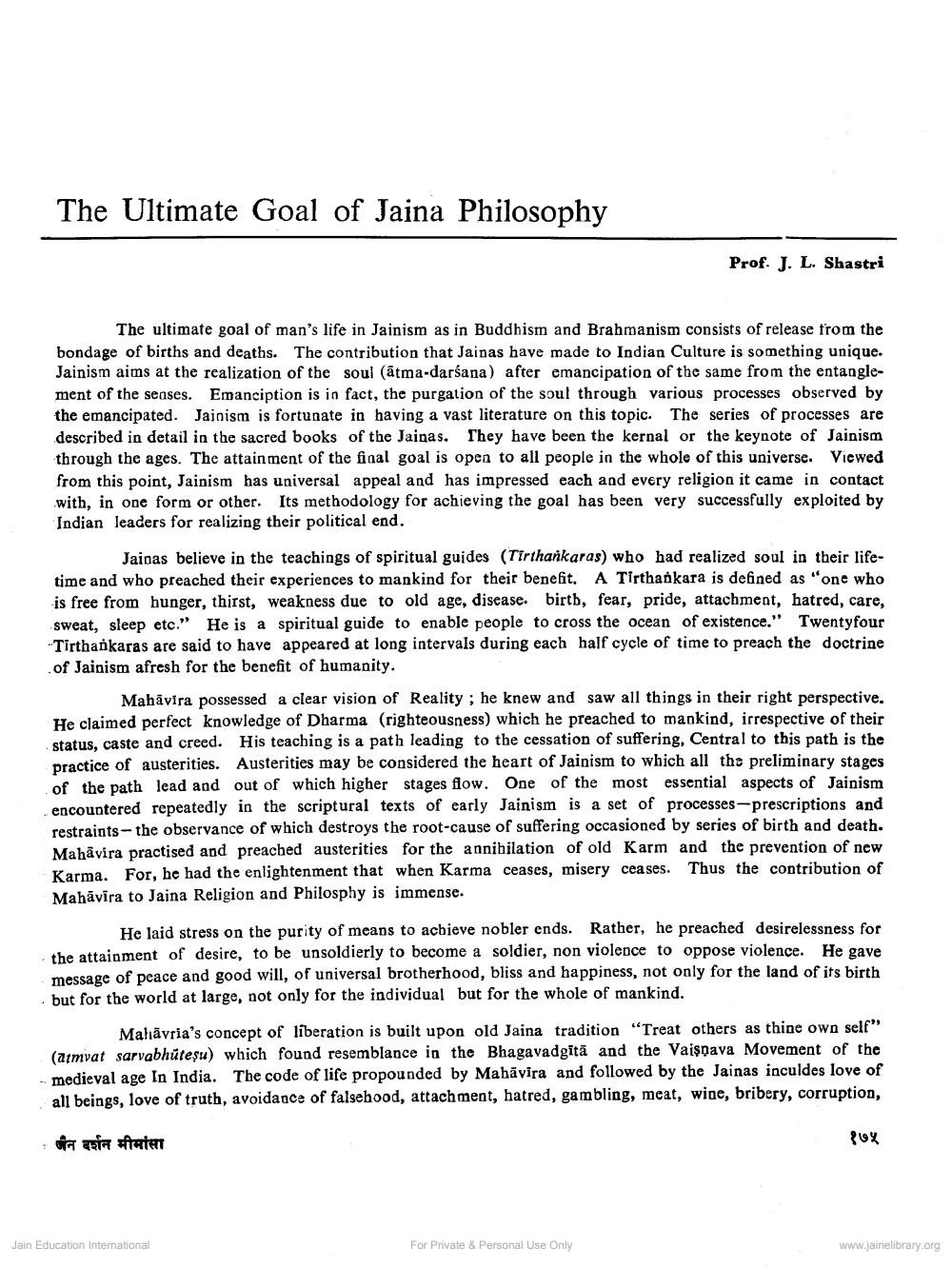________________
The Ultimate Goal of Jaina Philosophy
Prof. J. L. Shastri
The ultimate goal of man's life in Jainism as in Buddhism and Brahmanism consists of release from the bondage of births and deaths. The contribution that Jainas have made to Indian Culture is something unique. Jainism aims at the realization of the soul (ātma-darśana) after emancipation of the same from the entanglement of the seases. Emanciption is in fact, the purgation of the soul through various processes observed by the emancipated. Jainism is fortunate in having a vast literature on this topic. The series of processes are described in detail in the sacred books of the Jainas. They have been the kernal or the keynote of Jainism through the ages. The attainment of the final goal is open to all people in the whole of this universe. Viewed from this point, Jainism has universal appeal and has impressed each and every religion it came in contact with, in one form or other. Its methodology for achieving the goal has been very successfully exploited by Indian leaders for realizing their political end.
Jainas believe in the teachings of spiritual guides (Tirthankaras) who had realized soul in their lifetime and who preached their experiences to mankind for their benefit. A Tirthankara is defined as "one who is free from hunger, thirst, weakness due to old age, disease. birtb, fear, pride, attachment, hatred, care, sweat, sleep etc." He is a spiritual guide to enable people to cross the ocean of existence." Twentyfour Tirthankaras are said to have appeared at long intervals during each half cycle of time to preach the doctrine of Jainism afresh for the benefit of humanity.
Mahavira possessed a clear vision of Reality; he knew and saw all things in their right perspective. He claimed perfect knowledge of Dharma (righteousness) which he preached to mankind, irrespective of their status, caste and creed. His teaching is a path leading to the cessation of suffering, Central to this path is the practice of austerities. Austerities may be considered the heart of Jainism to which all the preliminary stages of the path lead and out of which higher stages flow. One of the most essential aspects of Jainism encountered repeatedly in the scriptural texts of early Jainism is a set of processes-prescriptions and restraints-the observance of which destroys the root-cause of suffering occasioned by series of birth and death. Mahavira practised and preached austerities for the annihilation of old Karm and the prevention of new Karma. For, he had the enlightenment that when Karma ceases, misery ceases. Thus the contribution of Mahāvira to Jaina Religion and Philosphy is immense.
He laid stress on the purity of means to achieve nobler ends. Rather, he preached desirelessness for the attainment of desire, to be unsoldierly to become a soldier, non violence to oppose violence. He gave message of peace and good will, of universal brotherhood, bliss and happiness, not only for the land of its birth but for the world at large, not only for the individual but for the whole of mankind.
Mahāyria's concept of liberation is built upon old Jaina tradition "Treat others as thine own self" (armvat sarvabhūteșu) which found resemblance in the Bhagavadgitā and the Vaişoava Movement of the - medieval age In India. The code of life propounded by Mahävira and followed by the Jainas inculdes love of
all beings, love of truth, avoidance of falsehood, attachment, hatred, gambling, meat, wine, bribery, corruption,
- जैन दर्शन मीमांसा
१७५
Jain Education International
For Private & Personal Use Only
www.jainelibrary.org




